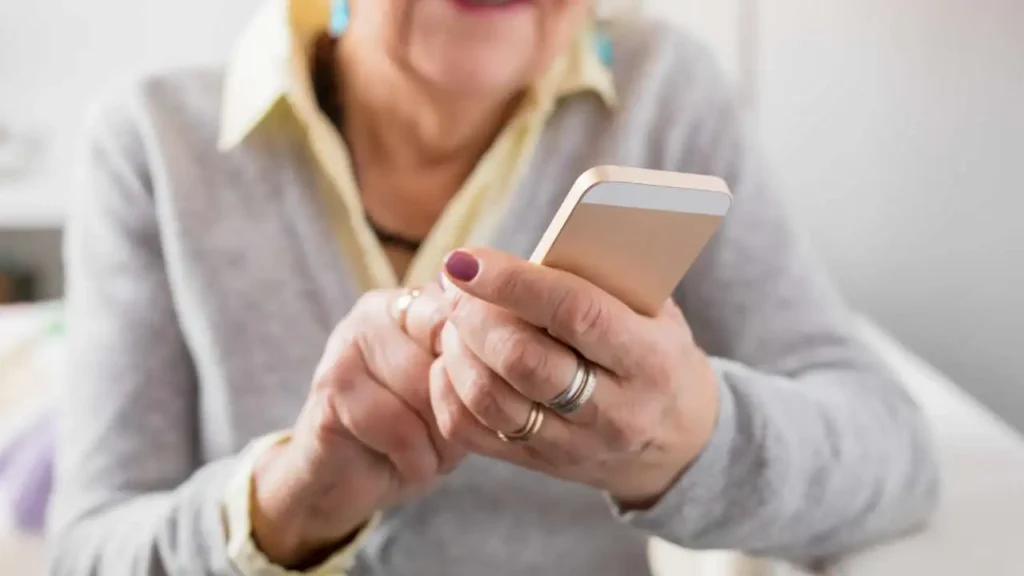Dementia is a progressive condition that affects memory, thinking, and behavior. It significantly impacts individuals’ ability to perform everyday activities, often leading to increased reliance on caregivers.
As technology continues to evolve, the question arises: should individuals with dementia have access to mobile phones?
This debate considers the balance between maintaining independence and ensuring safety. Mobile phones offer potential benefits like improved communication and access to emergency services, yet they also pose challenges, such as confusion and susceptibility to scams. Exploring this topic helps us understand the complexities involved in making an informed decision.
Benefits of Mobile Phones
Improved Communication with Family and Caregivers
Mobile phones can bridge the gap between individuals with dementia and their loved ones. They offer a means to maintain regular contact, easing feelings of isolation.
Quick calls or messages can provide reassurance and allow caregivers to monitor the well-being of those with dementia.
Access to Emergency Services
In emergencies, having a mobile phone can be a lifeline. Individuals can quickly reach out to emergency services when needed. This capability provides an added layer of security, ensuring timely assistance in critical situations.
Potential for Cognitive Stimulation
Mobile phones can serve as tools for cognitive engagement. Applications designed for mental stimulation, like puzzles or memory games, can aid in maintaining cognitive functions. These activities can be both enjoyable and beneficial, potentially slowing cognitive decline.
While mobile phones offer these advantages, it is vital to balance these benefits with the potential challenges faced by individuals with dementia. Exploring these aspects further will help in making informed decisions about mobile phone access.
Potential Risks and Concerns
Possibility of Confusion and Disorientation
For individuals with dementia, mobile phones can sometimes lead to confusion and disorientation. Navigating complex interfaces or remembering how to use various functions might become overwhelming. For instance, a person might mistakenly call the wrong contact or struggle to end a call properly.
Risk of Scams and Privacy Invasion
Elderly individuals, particularly those with cognitive impairments, are often targets for scams. The risk of falling prey to fraudulent calls, texts, or emails increases significantly.
A real-world example includes receiving phishing text messages that might convince someone to share personal information unknowingly.
Challenges in Managing Phone Usage
Managing phone usage can be particularly challenging for those with dementia. Time spent on devices might become excessive or inappropriate, such as making numerous calls or engaging in repetitive behaviors. Caregivers might find it difficult to monitor and regulate phone use without infringing on the individual’s independence.
These potential risks highlight the importance of considering both the safety and autonomy of individuals with dementia when deciding on mobile phone access.
Statistics on Dementia and Phone Usage
Dementia is a growing concern worldwide, affecting millions of individuals and their families. According to recent studies, approximately 50 million people globally are living with dementia, with nearly 10 million new cases each year. This suggests a pressing need to address how technology, like mobile phones, can play a role in their lives.
Among the elderly, mobile phone usage is steadily increasing. In fact, about 80% of seniors aged 65 and older own a mobile phone, with a significant portion using smartphones. This data reflects a broader trend of technology adoption among older adults, despite initial hesitations.
| Statistic | Value |
|---|---|
| Global dementia cases | 50 million |
| Annual new dementia cases | 10 million |
| Elderly mobile phone ownership | 80% |
As these numbers suggest, there is a significant opportunity to leverage mobile technology for individuals with dementia.
The challenge lies in ensuring that such technology is accessible and safe for those who might struggle with its complexities. Understanding these statistics helps emphasize the potential and the need for careful consideration in technology adoption for dementia patients.
Cognitive Challenges and Mobile Use
For individuals with dementia, memory issues can significantly hinder their ability to use mobile phones effectively.
Forgetting passwords, phone numbers, or even how to operate the device are common challenges that can lead to frustration and reduced confidence in using technology.
Navigating modern technology interfaces presents another hurdle. Many smartphones require a certain level of tech-savvy to operate, which can be difficult for those experiencing cognitive decline.
“Simplifying technology is crucial,” notes Dr. Emily Carter, a geriatric specialist. User-friendly designs can make a world of difference for dementia patients.”
Examples of cognitive decline impact are evident in real-life scenarios where dementia patients inadvertently delete important contacts or struggle with basic functions like answering calls.
These difficulties highlight the need for tailored solutions that consider the unique challenges faced by individuals with dementia.
Addressing these cognitive challenges is essential to leveraging the benefits of mobile phones while minimizing risks.
As we explore these issues, it becomes clear that both design and support play pivotal roles in enhancing accessibility for dementia patients.
Role of Caregivers
Caregivers play a pivotal role in managing mobile phone access for individuals with dementia. Ensuring supervision is crucial, as it helps balance the autonomy of the individual with the need for safety and security.
From the caregiver’s perspective, it’s essential to create an environment where technology can be beneficial without becoming overwhelming or risky. This involves employing various techniques for monitoring phone use:
- Setting time limits for phone usage to prevent excessive screen time.
- Using apps that provide alerts for unusual activity or potential security breaches.
- Regularly reviewing call logs and messages to ensure the safety of communications.
Balancing independence and safety is a delicate task. Caregivers must remain vigilant while respecting the dignity and autonomy of the person with dementia. This balance is vital to maintaining a sense of self-worth and empowerment for the individual.
The responsibility of caregivers extends beyond supervision; it includes fostering a supportive atmosphere where technology serves as an aid rather than a hindrance. By carefully monitoring and guiding mobile phone use, caregivers can enhance the quality of life for those with dementia.
Technology Solutions
As technology evolves, innovative solutions have emerged to support individuals with dementia, enhancing their daily lives and promoting safety.
Apps designed for dementia patients are increasingly popular, offering features like medication reminders, daily schedule prompts, and cognitive exercises. These apps can aid in maintaining routines and stimulating mental activity, helping users stay engaged.
Another significant advancement is simplified phone models. These devices are tailored for ease of use, with large buttons, clear displays, and minimalistic interfaces.
Brands like Jitterbug and Doro provide phones specifically designed for older adults, reducing the complexity and confusion often associated with modern smartphones.
Location tracking and safety features are crucial for ensuring the well-being of dementia patients. GPS-enabled devices allow caregivers to monitor the whereabouts of their loved ones, providing peace of mind. Some phones come with integrated emergency buttons, allowing users to quickly call for help if needed.
With these technology solutions, individuals with dementia can experience increased independence while caregivers can ensure their safety, creating a balanced approach to mobile phone access.
Ethical Considerations
The decision to grant mobile phone access to individuals with dementia is fraught with ethical dilemmas. One of the primary concerns is privacy.
Mobile phones can inadvertently expose personal information, leaving vulnerable individuals open to risks such as data breaches and unwanted tracking.
Another critical issue is the balance between autonomy and safety. While mobile phones can enhance independence, they can also lead to situations where individuals may become lost or confused.
This raises the question: should safety override the freedom of those with dementia, or should their autonomy be preserved at all costs?
“Balancing safety and autonomy is a delicate act requiring empathy and understanding.”
Informed consent is a significant consideration. Many dementia patients may struggle to fully comprehend the implications of using a mobile phone, making it challenging to obtain genuine consent.
This calls for careful assessment of their decision-making capacity and the involvement of caregivers or guardians in the process.
These ethical considerations highlight the complexity of integrating technology into the lives of individuals with dementia, underscoring the need for thoughtful, informed decision-making.
Legal Aspects
Navigating the legal landscape surrounding mobile phone access for individuals with dementia involves understanding regulations and legal frameworks designed to protect vulnerable populations.
These regulations aim to ensure that technology use does not compromise the safety and well-being of those with cognitive impairments.
Key regulations include:
- Data protection laws that safeguard personal information from misuse.
- Consumer protection regulations to prevent exploitation, such as scams targeting the elderly.
- Guidelines for technology providers to create user-friendly and accessible devices.
Another critical aspect is the role of guardianship and decision-making authority. Legal guardians or appointed family members often have the responsibility to make decisions on behalf of individuals with dementia, including the use of mobile phones. This can involve assessing the individual’s ability to understand and manage phone use safely.
There are legal precedents that highlight the need for safeguarding the rights and autonomy of individuals with dementia, while also considering their safety.
These cases often emphasize the importance of involving healthcare professionals and legal advisors in decision-making processes.
Global Perspectives
Understanding how different countries approach mobile phone access for individuals with dementia offers valuable insights into balancing autonomy and safety.
United Kingdom
In the UK, there is a strong focus on personalized care plans that incorporate technology. The National Health Service encourages using simplified phones as part of dementia care, emphasizing the balance between independence and safety.
Japan
With a rapidly aging population, Japan has embraced technology, including mobile phones, to support dementia care. Cultural respect for elders plays a role in developing user-friendly devices that honor autonomy while ensuring safety.
Australia
Australia’s approach involves community-based programs that integrate technology into dementia care. This includes trialing apps specifically designed to aid cognitive stimulation and improve communication for dementia patients.
International Case Studies
Case studies from Sweden and the Netherlands highlight innovative solutions like GPS-enabled devices, which allow individuals more freedom while maintaining safety. These examples demonstrate the potential for technology to enhance daily life for those with dementia.
A comprehensive map or infographic illustrating these global initiatives could provide a clearer picture of how diverse approaches to dementia and technology can influence outcomes.
Personal Stories
Mobile phones have become lifelines for many individuals living with dementia. Take the story of Helen, a former teacher who, despite her diagnosis, cherishes her daily phone calls with her granddaughter. “Hearing her voice every evening gives me a sense of normalcy and connection,” she shares.
For family members, these devices can offer peace of mind. John’s son, Michael, recounts how a simple mobile app allowed him to track his father’s whereabouts. “Knowing he’s safe when he’s out for a walk gives us both independence and reassurance,” he explains.
The impact of mobile phones on daily life isn’t always straightforward. While they can bridge the gap in communication, they can also introduce confusion. Mary, whose mother has dementia, notes that her mother often struggles to remember how to use her phone. Yet, the joy of seeing familiar faces during video calls outweighs these challenges.
These personal stories highlight the dual nature of mobile phones in the lives of those with dementia. They can bring both comfort and complexity, underscoring the importance of thoughtful integration into daily routines.
Expert Opinions
Healthcare professionals often highlight the potential benefits mobile phones can offer individuals with dementia. Dr. Lisa Turner, a geriatric psychologist, states, “Mobile phones can be a valuable tool for maintaining social connections and providing cognitive engagement.” She emphasizes the importance of personalized approaches to technology use, recognizing that each person’s needs and abilities differ.
Conversely, some technology experts caution against the unrestricted use of mobile phones. Alex Rodriguez, a tech analyst, argues, “The complexity of modern smartphones can lead to confusion and frustration for those with cognitive impairments.” He suggests that simplified devices and tailored applications could mitigate these challenges, offering a safer user experience.
Balancing these perspectives, experts agree on the necessity of a nuanced approach. The benefits of enhanced communication and access to emergency services must be weighed against risks such as privacy concerns and the potential for scams. As Dr. Turner notes, “The key is finding a balance that maximizes independence while ensuring safety.” This balanced view is essential in crafting effective solutions for individuals with dementia.
Pros and Cons Summary
When considering mobile phone access for individuals with dementia, it’s important to weigh the benefits and risks.
Mobile phones can offer improved communication, provide access to emergency services, and potentially serve as a tool for cognitive stimulation. However, challenges such as confusion, risk of scams, and privacy concerns must not be overlooked.
| Pros | Cons |
|---|---|
| Enhanced communication with family and caregivers. | Possibility of confusion and disorientation. |
| Access to emergency services for safety. | Risk of scams and privacy invasion. |
| Potential for cognitive engagement and stimulation. | Challenges in managing phone usage effectively. |
A balanced view considers these factors carefully. For those with dementia, the decision to use a mobile phone should be tailored to individual capabilities and needs.
Key considerations include the level of cognitive impairment, the availability of supervision, and the simplicity of the device.
Ultimately, informed decision-making, guided by caregivers and healthcare professionals, ensures that the benefits outweigh the risks, fostering both independence and safety.
Practical Recommendations
Navigating the use of mobile phones for individuals with dementia requires thoughtful strategies. Here are some practical recommendations for family members, healthcare providers, and technology developers:
Guidelines for Family Members:
- Provide simple instructions and training sessions to help them understand basic phone functions.
- Set up speed dial options for essential contacts to facilitate quick communication.
- Regularly monitor phone usage to prevent potential scams and ensure privacy protection.
Advice for Healthcare Providers:
- Assess the individual’s cognitive abilities to determine if phone usage is appropriate.
- Collaborate with families to create personalized plans addressing safety and independence.
- Stay updated on technology advancements that may benefit dementia patients.
Suggestions for Technology Developers:
- Design user-friendly interfaces that accommodate cognitive limitations.
- Incorporate features like location tracking and emergency alerts for added security.
- Engage with caregivers and healthcare experts to tailor solutions to real-world needs.
By following these recommendations, stakeholders can better support individuals with dementia in their use of mobile technology, balancing both safety and autonomy.
Conclusion
The debate over mobile phone access for individuals with dementia highlights the complexity of balancing autonomy with safety.
While phones offer significant benefits, they also pose potential risks. The decision to allow phone use should be grounded in a comprehensive understanding of these factors.
Informed decision-making is crucial. Families, caregivers, and healthcare providers must collaborate to tailor solutions that prioritize the well-being and dignity of those affected by dementia, ensuring their technology use is both safe and empowering.





